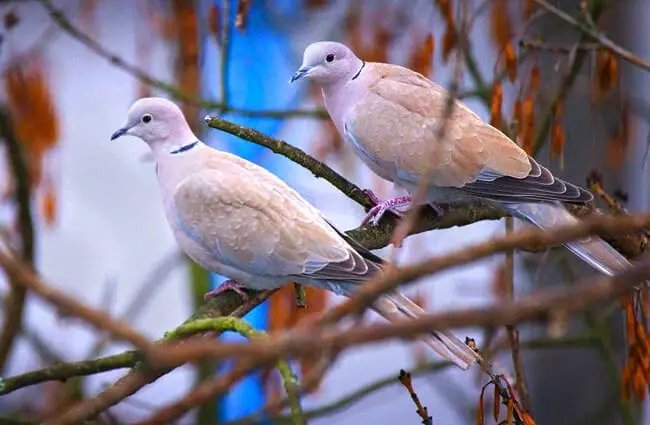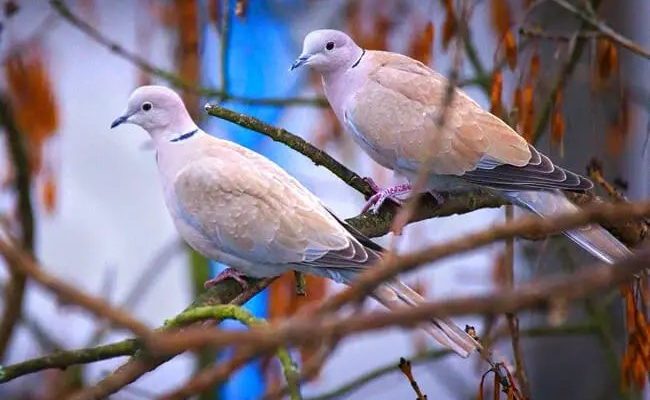
Imagine a lively cocktail party—some guests mingle easily, while others stick to familiar faces. Just like at that party, not every bird gets along harmoniously. So, let’s explore the dynamics of doves and other species, and see if it’s possible to create a happy, blended bird family.
Understanding Dove Temperament
Doves are generally known for their calm and gentle nature. They usually prefer to keep things peaceful, which makes them appealing pets. They’re not the type to engage in aggressive squabbles or loud cawing, like some other birds might. Instead, they often exhibit behaviors like soft cooing and gentle preening.
Let’s dive into what makes doves tick. These birds thrive in environments where they feel secure. Their calm demeanor is a huge plus when it comes to cohabitating with other species. However, their docile nature also means they might be vulnerable to bullying from more boisterous birds. This is important to keep in mind when planning your flock—if you invite a rowdy parakeet or a feisty cockatiel into the mix, your dove might end up feeling stressed.
In summary, doves are social creatures that tend to get along well with their own kind or with other gentle birds. But compatibility is key, and understanding their temperament is the first step in deciding if they can live with other species.
Choosing Compatible Bird Species
So you’re convinced that doves can be good roommates, but who else should share their space? When selecting other bird species to live with doves, it’s essential to choose those known for their placid behavior. Think of it like being part of a team; you want players who will work together harmoniously.
Here’s a list of bird species that are generally more compatible with doves:
- Finches
- Canaries
- Budgerigars (Budgies)
- Lovebirds
While these birds are often more docile, there are a few exceptions. Some lovebirds can be territorial, especially during the breeding season. That said, there are always quirky individuals in any species, and it’s crucial to observe their interactions.
It’s a good idea to gradually introduce doves to potential companions. This way, you can gauge how everyone gets along before making it a permanent arrangement.
Creating a Safe Living Environment
Now that you’re aware of which birds could potentially be good housemates for your dove, let’s discuss how to set the stage for a peaceful cohabitation. A good living environment is crucial for ensuring that all your birds feel comfortable.
Start by making sure the living space is spacious enough for the number of birds you have. Doves, in particular, need room to stretch their wings and explore. Consider a large aviary where they can fly around safely. Adding plenty of perches at different heights can help, as this gives the birds spaces to retreat if they feel overwhelmed.
It’s also essential to provide plenty of hiding spots and enrichment activities, like toys and climbing structures. This not only keeps your doves mentally stimulated but also gives them places to escape if they need a break from too much social interaction. Remember, a happy bird is usually a well-adjusted bird.
Monitoring Interactions
Once your doves are living with other birds, it’s crucial to monitor their interactions closely. Think of it as being a referee during a game—keeping an eye on the play to ensure no one gets too aggressive.
Watch for signs of stress or discomfort in your doves. This can include ruffled feathers, hiding more often, or a noticeable reduction in their usual cooing. If you notice your doves becoming stressed, it may be best to separate them from the group. It’s always better to prioritize their well-being over having a full house of birds.
Also, observing feeding times can provide insights into how well the birds are getting along. If your doves are struggling to get their share of food, they might be feeling bullied. You can consider feeding them in separate areas to ensure they get the nutrition they need without competition.
Feeding and Diet Considerations
Speaking of food, it’s essential to know that different bird species often have varied dietary needs. For doves, a diet rich in seeds, grains, and fresh vegetables works well. When adding other birds to the mix, it’s crucial to ensure everyone’s dietary needs are met.
If you’re mixing species, try to provide a balanced diet that caters to all of your birds. You might consider offering high-quality mixed seeds that include dietary components suitable for both doves and the other birds in your aviary. Just keep an eye on things—some birds may be more aggressive feeders than others.
Another thing to consider is *supplementing your doves’ diet* with calcium, especially if you have females who might lay eggs. Providing cuttlebone or powdered calcium can help keep them healthy and strong.
When to Consider Separation
Sometimes, despite your best efforts, things just don’t work out. You might find that even after taking precautions, your doves still aren’t thriving in a mixed environment. If you notice signs of stress, aggression, or constant bullying, it might be time to consider separating them.
Here’s the thing—sometimes, the peace and happiness of your pets come before the desire for a diverse flock. If your doves seem to be constantly on edge or not acting like themselves, it’s essential to prioritize their well-being. This doesn’t mean you can’t keep the other birds; think of it as creating a more suitable environment for each species.
Final Thoughts: Embracing the Journey
In conclusion, while doves can live with other bird species, successful cohabitation requires careful consideration and preparation. Understanding their temperament, choosing compatible companions, creating a safe environment, and monitoring interactions are all critical steps in ensuring everyone gets along.
Remember that every bird is unique. You might find that your doves are perfectly happy with a few gentle companions or that they prefer their own company. Whatever the outcome, embracing the journey of figuring out what works best for your feathered friends is part of the fun.
Your patience and observation will go a long way in ensuring your aviary is a happy, loving place for all its inhabitants.

